HEREDITARY: The Horror To End All Horrors
Ari Aster's 2018 feature film debut shook me to the core like few movies ever have, and here's why...
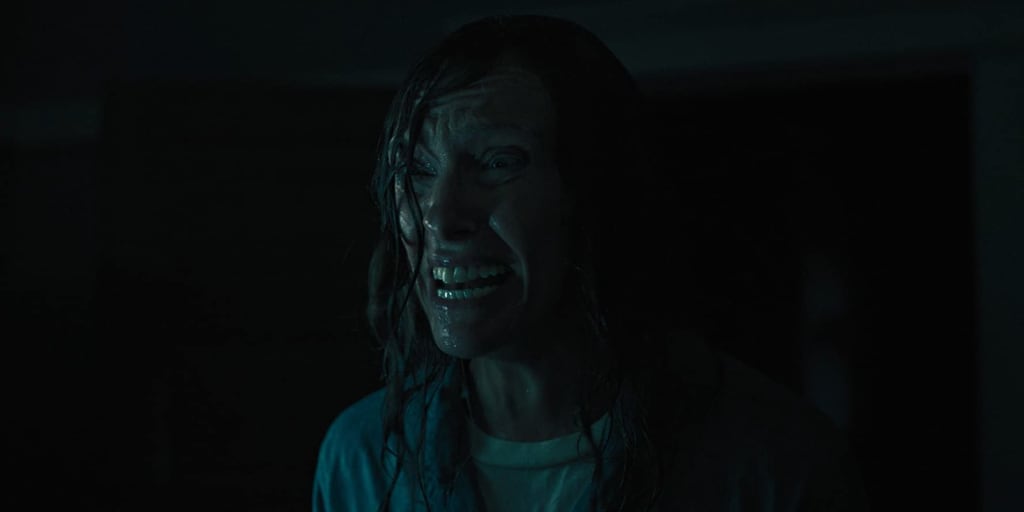
If you were to be asked the question of what you believe is the best horror movie ever made, coming to an answer is far from a straightforward proposition, as the question is wide open to a lot of interpretation and subjectivity, with many different avenues of thought to take into account.
What does the questioner, in their own personal approximation, consider a horror movie to be? Is it one containing copious lashings of blood and gore and viscera, and if so, is the violence deliberately brutal and disturbing, or deliberately cartoonish and over-the-top? Does their definition of a horror movie favour frequent startlesome jump scares, or anxious undercurrents of subdued, escalating dread? What do they find scary? Do they want to be genuinely scared, or do they want to be entertained? What do they consider "true" horror? Do they view the horror genre as being stories of vengeful ghosts and diabolical demons, teeth-baring monsters and omnipotent serial killers, horny teens and final girls? Or do they see horror as being stories of pointed social commentary, metaphorical examinations of the human condition, or direct confrontations of our deepest, darkest fears, conveyed through a medium that allows us to experience and process them in a kind of safe, controlled manner that real life rarely affords us? When you think of whatever "horror" means to you, does your mind veer towards the schlocky, trashy, camp, ultra-violent funhouse kind... the slow-burn, abstract, arthouse-y atmospheric kind... the depraved and twisted extreme gross-out kind... or the lingeringly psyche-rattling, upsettingly haunting kind? Or maybe even some combination of one or more of the above?
"Horror" means different things to different people. It encompasses far too many sub-genres, tonal styles, and audience mileages to afford there realistically being just one definitive all-time best example you can point to as the pinnacle of what horror cinema can be.
All I can offer, in my own hopelessly subjective opinion, is my reasoning behind why it is that whenever I think of the word "horror", the first immediate synonymous association my mind now jumps to...
...is Hereditary.
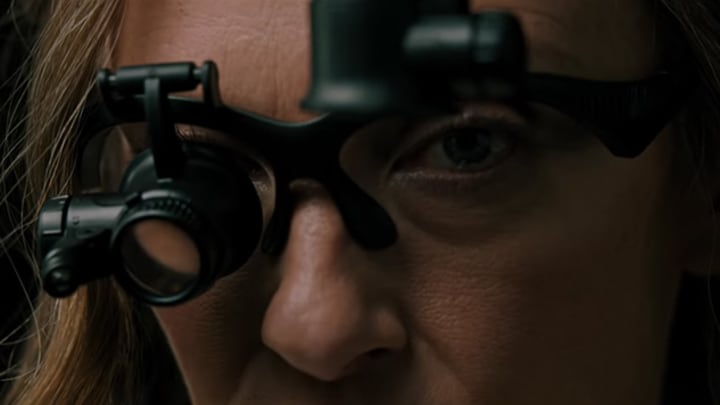
In the weeks leading up to the film's UK theatrical release in July of 2018, I had been keeping cautious of the head of hype that had built up around Hereditary after it had done the film festival circuit. Such initial nigh-universal positive buzz I hadn't heard since the days of Whiplash or Mad Max: Fury Road. But this soon became tempered by the tepid general audience response, which called into question precisely how good the actual film might be.
The biggest point of filmic comparison frequently made at the time was with a previous fellow A24 production, Robert Eggers' The Witch, which gave me a good gauge of how to calibrate my expectation levels - i.e. hearing in advance a ton of glowing reviews declaring it to be a horror masterpiece that was uniquely scary and felt almost literally unholy to watch, only to find that (for me) the film was only very very very very good, but alas fell frustratingly short of really hitting that sweet spot of what I find makes a horror film honestly horrific and truly terrifying (to me).
Hence, when I went into the cinema to see it with that in mind, I prepared myself for the potential outcomes that, at worst, Hereditary would totally suck and blow, or, at best, Hereditary would wind up leaving me feeling somewhat the same way The Witch did: 90% happily unnerved and impressed, and 10% slightly disappointedly short-changed that I didn't get out of it what all the five-star-reviewers had been so eloquently and convincingly saying they had gotten from it.
So I watched it, and...
...Hereditary turned out to be the real deal.
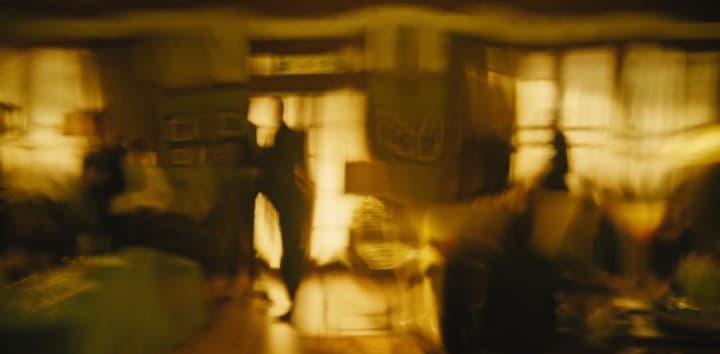
Whether you yourself have seen it or not, I won't be able to convince all of you of this (nor will I pretend that I could even do such a thing), because I can also recognise the things about the film that make it wholly not work for so many who watch it. Point of fact, during the last 20 minutes of my screening back on that fateful July evening, there were many in the audience who were actually laughing during many moments that the film was most certainly not intending to be funny, and once the credits started rolling, and everyone was getting up to leave, ahead of me I heard one girl say to the group she was with: "That was actually the funniest film I've ever seen!"
Meanwhile, I was still sitting in my seat, still re-learning to properly breathe, and regain enough composure to un-stiffen my rigidly clenched muscles so I could walk again (and I'm only mildly exaggerating about that). Moments later, a girl sitting with her boyfriend in the row in front of me happened to turn around, and she let out a sharp little scream in surprise at the sight of me, because as I would shortly find out from talking to them about the film as we left the cinema, she hadn't expected to see anyone sitting behind them, and also the film had creeped her out just enough to set her nerves highly on edge.
So when it comes to the type of scariness that Hereditary presents to you, believe me when I tell you that this is one of the ultimate examples of a "You-Get-Out-Of-It-What-You-Bring-To-It" movie if ever I've seen one.
But if you'll permit it, allow me to elucidate more in depth on the myriad reasons why this film worked so well on me then, and why its dark accursed spell continues to hover over me to this day, speaking just from my own experience of this blood-curdling filmic injection of pure uncut nightmare fuel...
***
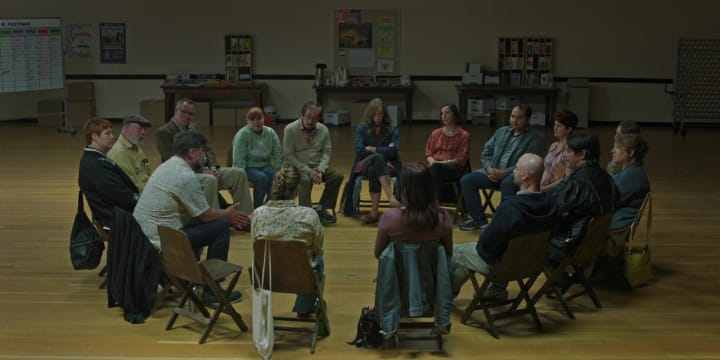
You know those times in your life when you're talking with another person, and at a point in the conversation, they happen to drop a bomb of information about something that's happened in their lives which is so unfathomably dark, unbearably sad, and unbelievably tragic, that you can barely bring yourself to imagine how they've survived such things, let alone are physically able to openly talk about what they've lived through?
You know those times in your life when you are that person, and you're fully aware of how thermo-nuclearly loaded your words, and your recounted experiences can be for others to hear and process, but even though you are the one who was directly personally affected, you become a kind of calm eye at the centre of the storm of your story, somehow capable of relaying what you've lived through just dispassionately enough to get through the telling of it without falling down?
Hereditary is all about people like that, on both sides of that dreadful coin. One person hearing others talk of living under the crippling weight of a grief and a trauma that they can't fully comprehend, even while that one person has been through their own ordeals that the others themselves wouldn't believe were possible to live with, let alone move on from.
It's about (as the title plainly suggests) the fear of familial inheritance of self-destructive forces you desperately hope you can escape, even while you know you have no control over what is and isn't skin/bone/genes-deep, and that sometimes, even though the future isn't set in stone, a part of your destiny may be written in your very blood; a ticking time-bomb, tucked deep within the code of your DNA.
It's about the insane and the absurd, each inextricably linked; that which is almost hilarious in its blatant nonsensical madness, swiftly becoming neutered, twisted, and coldly corrupted by the genuinely insane having an unblinking, unshakeable belief in something they see as making perfect infallible sense, which no one can rationally reason them out of, thus causing their resulting actions to be even more inexplicable and terrifying.
It's about feeling unsafe in your own home, and feeling fear of someone in your own family. Fear of every unpredictable response. Fear of every little move you make and word you speak being surveilled and catalogued for future emotional torture. Fear of accidentally triggering a violent outburst over something you didn't know you weren't supposed to say or think. Fear of what they could potentially do to you. And worst of all... the fear that you could one day become just like them.
Even though the world of Hereditary is tinged with a malevolence rooted in the supernatural, this doesn't negate the film's incisively truthful explorations of the comparatively mundane, but still very real, deep-rooted human fears that we are often too frightened to peer too closely at in a meaningful way, for fear that if we acknowledge their existence, those anxieties may swallow us whole.
That inhuman thrum of unholy menace surrounding the proceedings only serves to underline and amplify the darkness that was already lurking within the characters' souls. The gut-wrenching thing about it all is witnessing the tragedy of these characters' inner demons being cruelly exploited and manipulated by forces that will not allow them the chance to escape their cycle of illness and abuse, disavowing them of their autonomy and free will, until they're broken down into nothing more than playthings in a dollhouse...
***
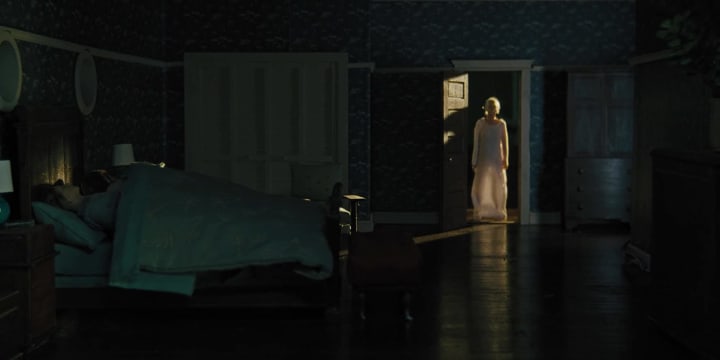
Now, without giving anything specific away: why does this film's ending sometimes underwhelm, or even outright repel, many of its viewers? Even those who actually were enjoying the film right up until then?
The thing about Hereditary is that if you look at it from just a straightforward plot perspective, it's generally cut from a pretty standard horror story mould. Should you boil it down to its bare-bones essentials, you'll find you've seen this sort of story done countless times before.
On a superficial level, it bears a passing resemblance to - and shares various mix-and-matched elements with - such films as Ti West's The House of the Devil, Roman Polanski's Rosemary's Baby, the third Paranormal Activity, Nicolas Winding Refn's The Neon Demon, Ben Wheatley's Kill List, Robin Hardy's The Wicker Man, Oz Perkins' The Blackcoat's Daughter, Daniel Stamm's The Last Exorcism, Yorgos Lanthimos' The Killing of a Sacred Deer, and the aforementioned The Witch.
In the case of all those films, their ultimate denouements dramatically vary in how successful they are in pulling off the particular horror tropes their finales all share, and doing so in a manner that doesn't feel repetitive or rehashed.
So why did Hereditary's ostensibly over-familiar ending push all the right buttons for me, even when its sort-of-selfsame implementation in House of the Devil, or Killing of a Sacred Deer, did not satisfyingly push any of those figurative buttons in the slightest, resulting in movies I found to be a major let down at the very end, right when it should have counted the most?
For one thing, it goes back to that old Roger Ebert saying:
"It's not what a movie is about... it's how it is about it."
And again, it goes back to that notion of the insane and the absurd.
Because looking at it divorced from context, Hereditary's finale features some patently ridiculous stuff that, by itself, would land it square into spoof territory - perhaps why so many people in the audience I was with on that day in 2018 were to be heard audibly giggling.
But as I saw it, the ridiculousness was vastly superseded by the ferociously frightening seriousness with which it was being taken by those characters who had laid the groundwork for this finale to happen, as seen by their multitude of monstrous actions that had lead to this ungodly finale even happening at all.
The near comical, the definitely vile, and the emotionally devastating were all intermingled into this sickening, roiling stew of utter stomach-twisting intensity, that made me feel like I was peering through a window that should never have been uncovered, into a scene of unbridled, unglamorous, repulsively repugnant true evil, and true insanity.
I felt my blood run cold, drain from my face, and pool in my feet.
My heart was all arrhythmic palpitation.
My gut sank away into the pit of an endless void.
My muscles constricted, shoulders hunched in recoil, hands claw-like clutching my legs in wound-up tightly coiled tension.
I almost couldn't bear to watch these events unfold...
...and yet, I couldn't tear my eyes away for a second.
***
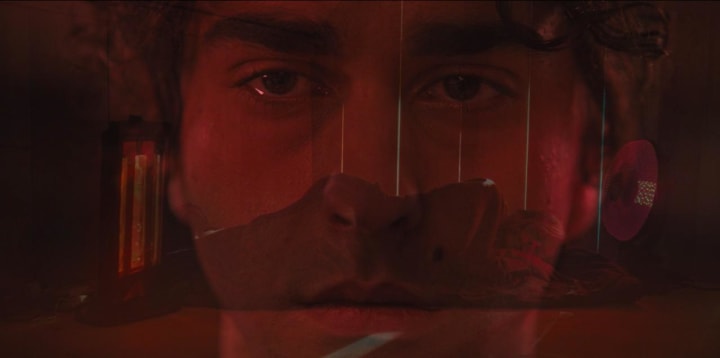
The command, control, patience, precision, subtlety, and mastery that writer/director Ari Aster has in his debut feature film is every hyperbolic superlative you can think of, and more. His is the kind of surefire directorial construction that, for a good long while afterwards, infuriatingly makes any other movie you watch seem inexcusably lazy and uninspired by comparison. Practically every shot you see is meticulously and ingeniously calibrated for wringing out the absolute maximum amount of dread, suspense, and occasional pure guttural, visceral distress that there is possible to extract from any given scene.
And much like, say, David Fincher - that great directorial hijacker of eyes - something that Aster excels at doing is the technique of suspense that Fincher calls "stretching the moment".
Aster will repeatedly pose a silent question - (what is that horrible sound? what is this character seeing that we're not? did something move out of the corner of your eye?) - and then streeeeetches out the gap between the question being asked, and the answer being revealed (or sometimes worse, not being revealed), which in turn hooks and reels you in like the plumpest bait, whether you like it or not. (And during the last act especially, you really do not like what awaits the end of those deliciously interminable stretched moments.)
The sickly gorgeous cinematography by Pawel Pogorzelski is a crucial, indispensable component to the overall film's creep factor, the ultra-wide compositions of every frame blurring the line of the scales in size between the real world, and Annie's obsessively detailed miniatures, so that they are rendered inextricable from one another; meanwhile, his way with conjuring and manipulating darkness, shadow, and cunning slivers of light are immensely fruitful in creating the innumerable unforgettable shots and images that you will never be able to un-see, nor scrub from your memory.
Then you have avant-garde saxophonist-turned-composer Colin Stetson's growling, rumbling, percussive, ravenously relentless score, a bone-quaking beast of gargantuan aural terror, evoking a non-stop, soup-thick unease that you want to beg for release from, but which it refuses to grant, showing no mercy in its mission to hungrily gnaw away at your every nerve with the frantic push-pull of a blunt saw-blade. (And that's without even mentioning the climactic track, 'Reborn', which is knee-quiveringly overwhelming in its literal awesomeness, and utterly petrifying in its punishingly fuzzed-out harshness of sound.)
Speaking of sound: THAT SOUND DESIGN is some serious black magic devilry, and it ought to be considered downright illegal. For while I was watching the film for the first time, I couldn't tell whether some of the odd, unnerving sounds I was hearing were emanating from the audience, from the film, or from my own increasingly frazzled mind.
This goes doubly so for that sound. You know the one. The little girl Charlie's mouth-click that's reminiscent of that glottal stop/gag reflex *CLUCK* sound Mark Zuckerberg makes in The Social Network?
Yeah.
That.
In the film, I thought I kept hearing it in parts where it wasn't being drawn attention to, and I wasn't sure if it was just all in my imagination, or if the sound design was playing it so intentionally subtly in order to mess with your head, and make you ask yourself whether or not you really heard it.
But then afterwards, as I was walking from the cinema back to the train station to return home, I stopped at a set of traffic lights, waiting for them to turn red so the cars would stop, and those of us on foot could walk across to the other side, when suddenly--
...[*cluck*]--
--WHO DID THAT?!?
WHERE DID THAT COME FROM!????
DID I ACTUALLY HEAR THAT???!?
DID SOMEONE WHO WAS IN THE SAME SCREENING AS ME JUST HAPPEN TO PASS BY, AND UNRELATEDLY MADE THE SOUND TO FREAK THEIR FRIENDS OUT??????!??!??!
Needless to say, it was me who was the one left freaked out, because I was now seemingly being followed right out of the cinema doors by the inescapable haunting spectre of Hereditary, which had already burrowed into my skull and begun to live in my head rent-free, and where it has resided ever since.
But naturally, the biggest thing that helps sell the movie as well as it does to those receptive to it, is the unequivocally exemplary acting from certainly all and sundry in the cast, but especially Toni Collette and Alex Wolff, who both deliver such god-tier, first-class, frighteningly all-caps INTENSE performances that put them through the most rigorous of emotional wringers, that you find yourself worrying for their off-screen health thereafter, and how they mentally coped with the cacophony of acute psychological havoc we see them put themselves through for the sake of the movie.
Collette has always been a great actress (not so much "underrated", but rather so chameleonically good in every role she's given, that she just becomes those characters, slipping under the radar of your mind until you're suddenly struck with the realisation: "Oh yeah! Toni Collette's always been this great!")...
...but here? In Hereditary?
She. Is. BEYOND.
Mere words alone cannot adequately express her supreme skill on display as she uses this role to demonstrate a masterclass in the craft of acting (that I suppose was just too good for the Oscars to appreciate). The palpably visible depths of sorrow, pain, fury, desperation, and blinding fear - both felt and dealt - that she is able to summon from within herself, and fearlessly portray on-screen with that face on her face (to paraphrase the much-memed "I am your MOTHER!" monologue), is a monumental acting triumph.
***
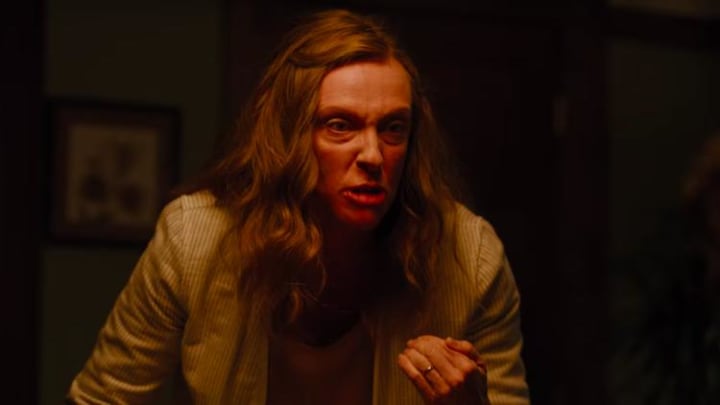
But now, it's time for me to stop dancing around and avoiding the point of writing about the serious, unabashed, real reasons why Hereditary resonates with me as much as it does. Besides its unparalleled craftsmanship, exceptional acting, nightmarishly harrowing imagery, and agonisingly unrelenting atmosphere that grips your heart and your throat in its cold vice-like grip, refusing to ever let go... there's one more aspect to the film's horrors that strikes a deeper chord for me.
***
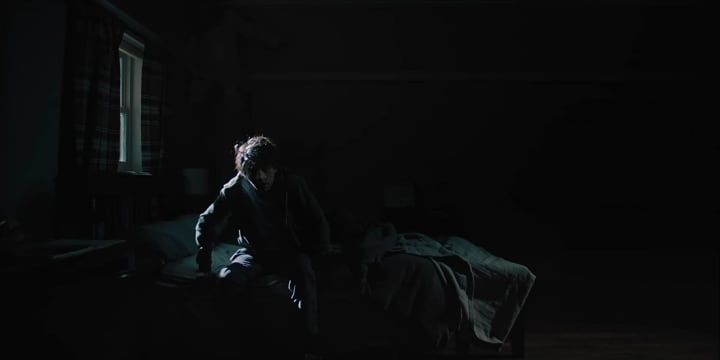
So...
...Toni Collette's Annie Graham is essentially my mother.
The Graham family's troubled history is essentially my family's troubled history.
Their generational and genetic fears are essentially my generational and genetic fears.
Sure, by comparison, my history and my family tree is nowhere near as dark, violent, and/or paranormally-inflected as the Graham family's history and family tree (because this is a fictional horror film, after all).
But, all the same?
Annie Graham's psychological instability, wild mood swings, emotional abuse, overwrought outbursts of aggressive shouting, all interspersed with these fleeting moments of affection, self-awareness, calm, and humour that only worsen the torture inflicted, as you glimpse the normal person - the normal mother - that she could be?
That was my mother.
The fear Annie, and her son Peter, feel about the potential of inevitably inheriting the genes and/or learned behaviours - the nature and/or the nurture - of those who raised them, passing it on down to those they always wanted to be spared the same negativity they experienced, thus perpetuating the same vicious cycle?
I know my mother was afraid of that. Even if she wouldn't admit it to herself, and even though she was already in the throes of the effects of the nature and nurture of her kin, who all shared so many of the same traits.
And I know that I am deathly afraid of the possibility that one day, some latent strand of un-ignited DNA, or some faulty wiring in my brain yet to be sparked, will make me lose touch with reality, or maybe corrupt and erase my memory...
...or that even just the manipulative guilt-guided manner in which I was brought up will one day make me unintentionally treat someone I love in the same way, thus cementing the cycle's repetition.
I am afraid of whatever my bloodline has made hereditary...
...and thus, I am afraid of Hereditary.
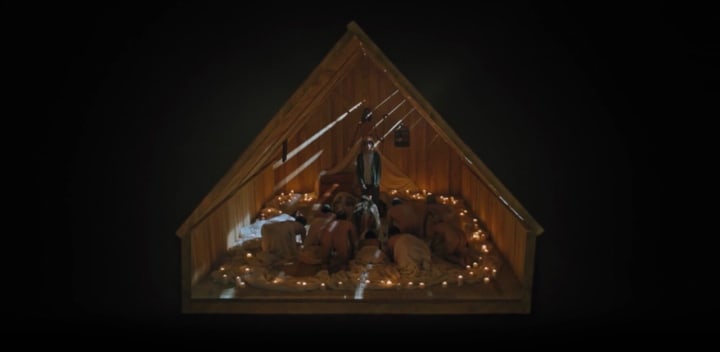

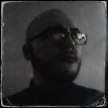


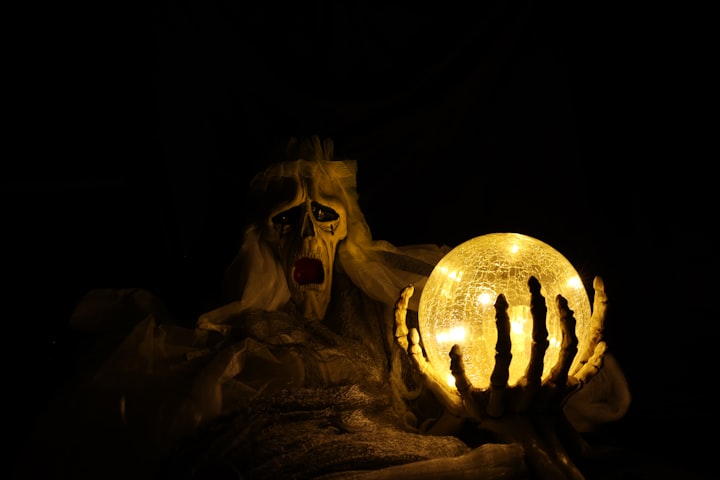

Comments
There are no comments for this story
Be the first to respond and start the conversation.